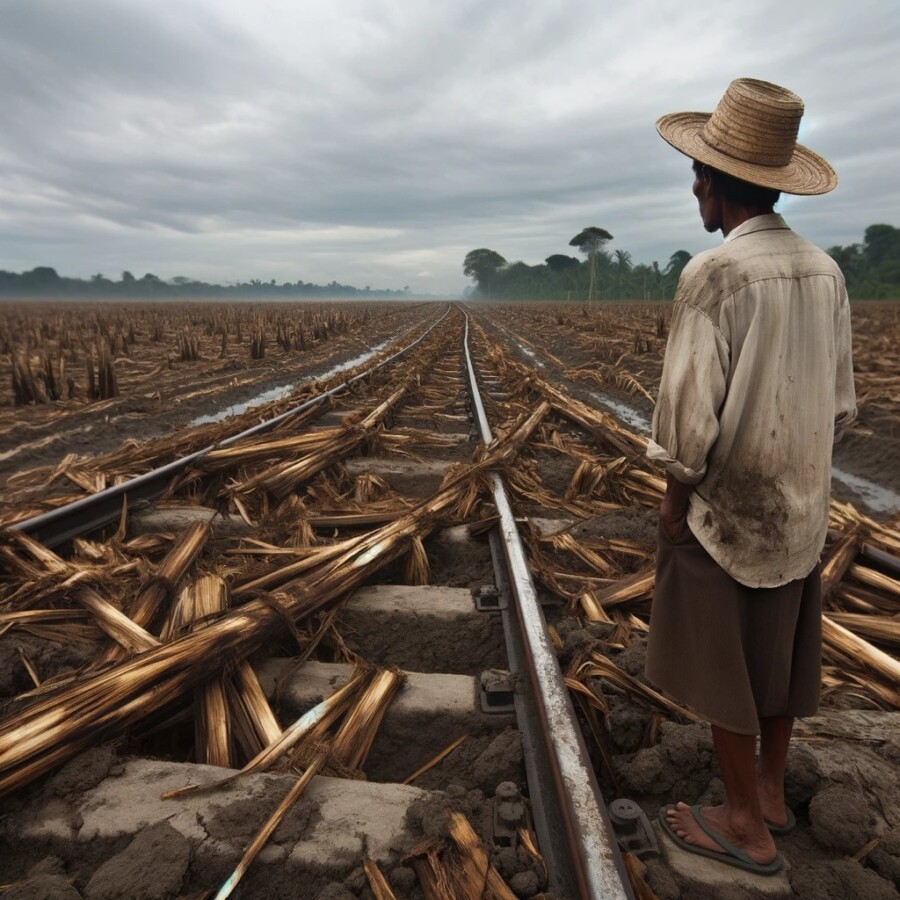Brazil is going through a really hot time right now. Almost 3,000 towns and cities have been put on red alert because of the heat. In Rio de Janeiro, the temperature reached a record-breaking 42.5C on Sunday. It felt even hotter because of the high humidity, reaching a crazy 58.5C. Over a hundred million people have been affected by this extreme heat, and it’s expected to last until at least Friday. Officials say this is happening because of something called El Niño and climate change.
The heat is also affecting the city of São Paulo. On Tuesday, the average temperature there was 37.3C. The National Institute of Meteorology has issued red alerts for a big part of the country, which means temperatures might be 5C higher than usual for a long time. This is really dangerous for people’s health. Because of the heat, people are using a lot more energy to try to stay cool.
This heatwave is happening more than a month before summer is supposed to start in the southern hemisphere. Research has shown that temperatures in Brazil have been higher than normal from July to October. Climate change is making extreme weather happen more often and be more intense all over the world. Heatwaves are expected to keep getting worse as long as we keep putting greenhouse gases into the air.
Besides climate change, Brazil is also going through something called El Niño, which makes the whole world hotter. The heatwave is expected to last until at least Friday and is affecting cities like São Paulo. It’s been really hard for people to work and sleep because of the extreme heat. Some people say it’s unbearable. It’s really important for individuals and governments to do something about climate change and protect the people who are most at risk from extreme heat.
Original news source: Brazil: Health warnings as country gripped by ‘unbearable’ heatwave (BBC)
Listen
Slow
Normal
Fast
Group or Classroom Activities
Warm-up Activities:
– News Reporter Role-play
Instructions: Students pair up, with one student taking on the role of a news reporter and the other being an expert on climate issues. The reporter conducts an interview with the expert about the recent heatwave in Brazil, using information from the article. Encourage students to use their own words and expand on the topic with questions about the causes and effects of climate change and El Niño.
– Opinion Poll
Instructions: Create a series of statements about climate change, El Niño, and their effects based on the article’s content. Students walk around the class and poll their classmates to find out their opinions on these issues. They should use phrases like “Do you agree that…”, “What is your opinion on…”, and “How do you feel about…”. After polling, students can discuss the results in small groups or as a class, providing an opportunity to practice agreeing and disagreeing politely.
– Word Association
Instructions: Write the word ‘Heatwave’ on the board. Students take turns coming to the board and writing a word or phrase associated with ‘Heatwave’ that they remember from the article or that they associate with it. This can include related vocabulary such as ‘El Niño’, ‘climate change’, ‘red alert’, ‘humidity’, etc. Discuss the words as a class, and encourage students to use them in sentences.
– Future Predictions
Instructions: Based on the information in the article about the heatwave in Brazil and the role of climate change, students make predictions about the future of the Earth’s climate. They can discuss these predictions in pairs or small groups, using the future simple tense (will) and future perfect tense (will have + past participle). Encourage them to consider both short-term and long-term predictions, and what actions might be taken to mitigate the effects of climate change.
– Pass the Story
Instructions: Start a story that relates to the article, for example, “In the city of Rio de Janeiro, where temperatures soared to record highs, a group of friends decided to…” Each student then adds a sentence to the story, passing it along from one student to the next. The goal is to create a coherent narrative that includes vocabulary and themes from the article about the heatwave, El Niño, and climate change, while also practicing creative storytelling and past tense narration.
Comprehension Questions:
1. What was the highest temperature recorded in Rio de Janeiro on Sunday?
2. How has the high humidity in Rio de Janeiro affected the way the temperature feels?
3. How many people have been impacted by the extreme heat in Brazil?
4. What are the two main reasons officials give for the current heatwave?
5. What was the average temperature in São Paulo on Tuesday?
6. What warning has the National Institute of Meteorology issued for a large part of Brazil?
7. When is summer expected to start in the southern hemisphere, and how does this relate to the current heatwave?
8. What are the effects of the heatwave on the daily lives of people in cities like São Paulo?
Go to answers ⇩
Listen and Fill in the Gaps:
Brazil is going through a really hot time right now. Almost 3,000 towns and cities have been put on red alert because of the heat. In Rio de (1)______, the temperature (2)______ a record-breaking 42.5C on Sunday. It felt even (3)______ because of the high humidity, reaching a crazy 58.5C. Over a hundred million people have been (4)______ by this extreme heat, and it’s expected to last until at least Friday. Officials say this is happening because of something called El Niño and climate (5)______.
The heat is also affecting the city of São (6)______. On Tuesday, the average temperature there was 37.3C. The National Institute of Meteorology has issued red alerts for a big part of the country, which means temperatures might be 5C higher than usual for a long time. This is really dangerous for (7)______’s health. Because of the heat, people are using a lot more (8)______ to try to stay cool.
This heatwave is (9)______ing more than a month before summer is supposed to start in the southern hemisphere. Research has shown that temperatures in Brazil have been higher than normal from July to October. Climate change is making extreme weather happen more often and be more (10)______ all over the (11)______. Heatwaves are expected to keep getting (12)______ as long as we keep putting greenhouse gases into the air.
Besides climate change, Brazil is also going through something called El Niño, which (13)______ the (14)______ world hotter. The heatwave is expected to last until at least Friday and is (15)______ cities like São Paulo. It’s been really hard for people to work and sleep because of the extreme heat. Some people say it’s (16)______. It’s really important for individuals and governments to do something about climate change and protect the people who are most at risk from extreme heat.
Go to answers ⇩
Discussion Questions:
Students can ask a partner these questions, or discuss them as a group.
1. What is the hottest temperature you have ever experienced? How did you feel?
2. How do you usually stay cool during a heatwave?
3. Do you think it’s important for schools to teach about climate change? Why or why not?
4. What are some ways people can help reduce climate change?
5. Have you ever heard of El Niño before? What do you think it is?
6. Why do you think extreme weather is becoming more common?
7. How would you feel if your city was put on a red alert for heat?
8. Do you like hot weather or do you prefer it to be cooler? Why?
9. What do you think governments should do to protect people from extreme heat?
10. Do you think climate change will affect your future? In what ways?
11. Have you ever had any problems sleeping because it was too hot? What did you do?
12. What is your opinion on using air conditioning to stay cool? Do you think it’s good or bad for the environment?
13. If you could invent something to help people during a heatwave, what would it be?
14. Do you think there are any benefits to having a hot climate?
15. How do you think we can educate more people about the dangers of climate change?
Individual Activities
Vocabulary Meanings:
Match each word to its meaning.
Words:
1. hot
2. temperature
3. heatwave
4. climate change
5. extreme
6. humidity
7. affected
8. greenhouse gases
Meanings:
(a) A measure of how hot or cold something is
(b) Very intense or severe
(c) Influenced or impacted by something
(d) The long-term change in Earth’s weather patterns
(e) Very warm or high in temperature
(f) The amount of moisture in the air
(g) Gases that trap heat in the Earth’s atmosphere
(h) A period of unusually hot weather
Go to answers ⇩
Multiple Choice Questions:
1. How many towns and cities in Brazil have been put on red alert because of the heat?
(a) Less than 100
(b) Almost 3,000
(c) Around 500
(d) More than 5,000
2. What was the record-breaking temperature reached in Rio de Janeiro?
(a) 42.5C
(b) 35.0C
(c) 40.0C
(d) 45.0C
3. Why did the temperature in Rio de Janeiro feel even hotter?
(a) Strong winds
(b) Low humidity
(c) Heavy rain
(d) High humidity
4. How many people have been affected by the extreme heat in Brazil?
(a) Less than a million
(b) Around ten million
(c) Over a hundred million
(d) More than two hundred million
5. How long is the extreme heat expected to last?
(a) Only for a day
(b) For the entire summer
(c) Until at least Friday
(d) Until the end of the year
6. What is the average temperature in São Paulo on Tuesday?
(a) 37.3C
(b) 30.0C
(c) 40.0C
(d) 35.0C
7. What does a red alert from the National Institute of Meteorology mean?
(a) Temperatures might be 5C lower than usual for a long time
(b) Temperatures might be 5C higher than usual for a long time
(c) There is a chance of heavy rain
(d) There is a chance of strong winds
8. Why is it dangerous for people’s health to have higher temperatures for a long time?
(a) People may become more energetic
(b) People may sleep better
(c) People may feel more comfortable
(d) People may suffer from heat-related illnesses
Go to answers ⇩
True or False Questions:
1. Only a few million people have been affected by this extreme heat, and it is not expected to continue until at least Friday.
2. The National Institute of Meteorology has issued red alerts for a large part of the country, indicating temperatures 5C higher than usual for an extended period.
3. On Sunday, Rio de Janeiro reached a record-breaking temperature of 42.5C, which felt even hotter due to the high humidity of 58.5C.
4. The city of São Paulo is also being affected by the heat, with an average temperature of 37.3C on Tuesday.
5. Brazil is currently experiencing a mild period, with only a few towns and cities on red alert due to the heat.
6. The excessive heat poses a significant health risk to the population, leading to increased energy consumption as people try to stay cool.
7. This heatwave is occurring later than expected, happening less than a month before summer is supposed to start in the southern hemisphere.
8. Officials attribute this heatwave to factors other than El Niño and climate change.
Go to answers ⇩
Write a Summary:
Write a summary of this news article in two sentences.
Check your writing now with the best free AI for English writing!
Writing Questions:
Answer the following questions. Write as much as you can for each answer.
Check your answers with our free English writing assistant!
1. What temperatures were recorded in Rio de Janeiro and how did the humidity affect how hot it felt?
2. How many people in Brazil are suffering from the extreme heat conditions?
3. What are the two main reasons officials are blaming for the high temperatures in Brazil?
4. What unusual weather pattern is contributing to the heatwave in Brazil, and what is its effect on global temperatures?
5. Why is it crucial for both individuals and governments to take action against climate change, according to the article?
Answers
Comprehension Question Answers:
1. What was the highest temperature recorded in Rio de Janeiro on Sunday?
The highest temperature in Rio de Janeiro on Sunday was a scorching 42.5C.
2. How has the high humidity in Rio de Janeiro affected the way the temperature feels?
The high humidity made it feel even hotter, with the temperature feeling like a sweltering 58.5C.
3. How many people have been impacted by the extreme heat in Brazil?
Over a hundred million people have been affected by the extreme heat in Brazil.
4. What are the two main reasons officials give for the current heatwave?
Officials say the heatwave is due to El Niño and climate change.
5. What was the average temperature in São Paulo on Tuesday?
On Tuesday, the average temperature in São Paulo was 37.3C.
6. What warning has the National Institute of Meteorology issued for a large part of Brazil?
The National Institute of Meteorology has issued red alerts for a large part of Brazil, indicating that temperatures could be 5C higher than usual for an extended period.
7. When is summer expected to start in the southern hemisphere, and how does this relate to the current heatwave?
Summer in the southern hemisphere is supposed to start more than a month after the current heatwave, which means the heatwave is occurring unusually early.
8. What are the effects of the heatwave on the daily lives of people in cities like São Paulo?
The heatwave is making it really hard for people in cities like São Paulo to work and sleep, with some saying the heat is unbearable.
Go back to questions ⇧
Listen and Fill in the Gaps Answers:
(1) Janeiro
(2) reached
(3) hotter
(4) affected
(5) change
(6) Paulo
(7) people
(8) energy
(9) happen
(10) intense
(11) world
(12) worse
(13) makes
(14) whole
(15) affecting
(16) unbearable
Go back to questions ⇧
Vocabulary Meanings Answers:
1. hot
Answer: (e) Very warm or high in temperature
2. temperature
Answer: (a) A measure of how hot or cold something is
3. heatwave
Answer: (h) A period of unusually hot weather
4. climate change
Answer: (d) The long-term change in Earth’s weather patterns
5. extreme
Answer: (b) Very intense or severe
6. humidity
Answer: (f) The amount of moisture in the air
7. affected
Answer: (c) Influenced or impacted by something
8. greenhouse gases
Answer: (g) Gases that trap heat in the Earth’s atmosphere
Go back to questions ⇧
Multiple Choice Answers:
1. How many towns and cities in Brazil have been put on red alert because of the heat?
Answer: (b) Almost 3,000
2. What was the record-breaking temperature reached in Rio de Janeiro?
Answer: (a) 42.5C
3. Why did the temperature in Rio de Janeiro feel even hotter?
Answer: (d) High humidity
4. How many people have been affected by the extreme heat in Brazil?
Answer: (c) Over a hundred million
5. How long is the extreme heat expected to last?
Answer: (c) Until at least Friday
6. What is the average temperature in São Paulo on Tuesday?
Answer: (a) 37.3C
7. What does a red alert from the National Institute of Meteorology mean?
Answer: (b) Temperatures might be 5C higher than usual for a long time
8. Why is it dangerous for people’s health to have higher temperatures for a long time?
Answer: (d) People may suffer from heat-related illnesses
Go back to questions ⇧
True or False Answers:
1. Only a few million people have been affected by this extreme heat, and it is not expected to continue until at least Friday. (Answer: False)
2. The National Institute of Meteorology has issued red alerts for a large part of the country, indicating temperatures 5C higher than usual for an extended period. (Answer: True)
3. On Sunday, Rio de Janeiro reached a record-breaking temperature of 42.5C, which felt even hotter due to the high humidity of 58.5C. (Answer: True)
4. The city of São Paulo is also being affected by the heat, with an average temperature of 37.3C on Tuesday. (Answer: True)
5. Brazil is currently experiencing a mild period, with only a few towns and cities on red alert due to the heat. (Answer: False)
6. The excessive heat poses a significant health risk to the population, leading to increased energy consumption as people try to stay cool. (Answer: True)
7. This heatwave is occurring later than expected, happening less than a month before summer is supposed to start in the southern hemisphere. (Answer: False)
8. Officials attribute this heatwave to factors other than El Niño and climate change. (Answer: False)
Go back to questions ⇧















